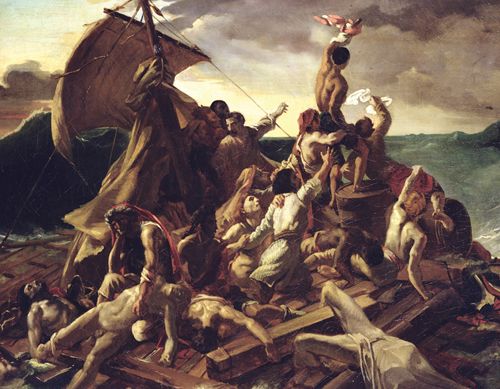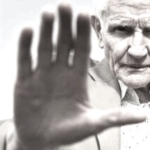
How can this be said by anyone who calls himself a Muslim? A divine Sunna recognises neither substitution nor change according to the Qur'anic verse: Allah does not change the condition of a people until they change their own condition.[1] The first thing we must work to change, resolutely, is the way we think and view the world.
THINGS ARE FIXED when minds and ideas remain fixed. This, of course, is not enough, for consciences and souls must also be reformed, but it is something more than merely necessary. Without a serious and radical intellectual reform it is impossible to reform the conditions of a country and its people. Reforming thinking and correcting perceptions is the basis for a sound civilized construction of a nation. This is how the righteous man comes about, one who builds a universal civilization of mercy: And We have not sent you but as a mercy to the worlds. [2]
“If, O Muslim, you are not in your heart, mind and deed, a mercy to the worlds”, wrote Essam al-‘Aṭṭār,
then you are on a path other than the path of your Messenger Muḥammad (may Allah’s peace and blessings be upon him), for his Lord, who sent him, said to him: We have not sent you but as a mercy to the worlds.
The true Muslim can only strive in this life to be a mercy to the worlds. Mercy is an inherent characteristic of him that never ceases, a firmly-rooted trait of his refined behaviour, the badge of his lofty authentic spirituality, and the primary characteristic by which he is known among people. Even non-human creatures – animals and inanimate objects – are touched and affected by this mercy. A human is therefore a being imbued with a culture of non-violence.
In short, regarding this culture of non-violence, I hold that the prescription for treating the manifold chronic diseases that this nation suffers from must place at its centre the glorification, spreading and activating of a culture of non-violence, of tolerance and love. We need a sound framework of thinking. We want a culture that does not glorify death, but life in all its manifestations; we want a culture free from the spreading of sectarian or religious hatred. The non-violence I mean does not equate to non-resistance or submission to injustice, but an effective, practicable and commendable resistance is one that is intelligent – for the real world is a cruel place and often ruthless to those that are weak and unintelligent. This type of intelligent resistance is the one which retains its humanity. It is not an easy thing, particularly at some times and some exceptional circumstances, but resistance in this way represents in my view the highest level of true jihād.
A true Muslim, then, should be a mercy to all creatures in everything he does or produces. Yet from time to time a shaykh will appear issuing a fatwā to the Ummah that they should:
Beware asking your Lord, the Merciful, Gracious, Affable, Compassionate, Kind and Gentle One, for any mercy for the sake of the dead of other sons of Adam!
What a delusion wrapped in a delusion – that mercy for the dead of our opponents should bring upon us wrath from His merciful name! We have thus become the strangest nation brought out to people[3]: it would not be fanciful to find that on the death of one of our bad people, one who may have spent his life committing all manner of evil and immoral acts, will have a fatwā issued on his behalf him, saying that “It is permissible to pray for mercy and forgiveness for him because he died a Muslim” whereas for one who defended all those oppressed in the world it will be “It is forbidden to pray for mercy for him because he died an infidel”!
Is it conceivable, you crowd of shaykhs, that an evil person is to be labelled a Muslim and one who does good a kāfir?

Suggested Reading
Our religious shaykhs, in their entirety, are sorely in need of a new way of thinking that will enable them to absorb the breadth of human experience worldwide, and extract them from the shell of haughty self-differentiation from the Other that they are still stubbornly entrenched in, and out into the vast humane and civilized arena. They should open up their hearts to all creatures, expand their horizons and elevate their sense of humanity, if they do indeed have a sincere and genuine desire to become ‘merciful’ to the whole world, to be an effective and positive contributor to shaping the future, and if they are serious in seeking to build elevated societies better balanced in their material and spiritual aspects, and more humane.
When will it be that our religious philosophy will rise to the level of We have not sent you but as a mercy to the worlds?
For Muṣṭafā Maḥmūd “Religion must be presented anew in its pure origins,
in a modern universal language that addresses everyone everywhere, not in a language that is closed and fanatically sectarian. Religion must be represented by its spirit and essence and not by its formalities: that is, religion in its first place as monotheism, ethics, responsibility and action, religion as love, cosmic consciousness, science and its sanctification of goodness and beauty.[4]
For Muḥammad Shahrour:
Islam, as a religion of mercy, is the more suited than anything else to spread a culture of love, tolerance and peace to all humanity.
while Muslims, in the opinion of ‘Abd al-‘Azīz Kaḥīl, have had a lot of the beauty of their religion swept away in smoke that has obliterated in them the features of humanity:
We want to purify our minds of darkness and cast out cruelty from our hearts, so that we may know, in accordance to the authentic teachings of our faith, that the outstretched hand has great power, that many a smile is more powerful than a weapon, that what unites human beings is far greater than what divides them, because the one who holds them accountable for their beliefs – be they true of corrupted – is God Almighty alone on the Day of Resurrection … We should make others know that we feel his joy and his sadness, we love for him what we love for ourselves, that we are both in the same boat him in one boat, the boat of this worldly life, and that we can travel in it together.[5]
[1] Qur’ān XIII (al-Ra‘d), 11.
[2] Qur’ān XXI (al-Anbiyā’), 107.
[3] The author is referring here, by his contrast, to the Qur’ānic phrase Ye are the best community that hath been raised up for mankind [Qur’ān (Āl ‘Umrān), 110. (Ed.)
[4] Mustafa Mahmoud, نار تحت الرماد (Fire Under the Ashes), 1979.
[5] ‘Abd al-‘Azīz Kaḥīl, إنسانية المسلم (The Humanity of the Muslim), online article, 2017.
Main image: All on the same boat: The Raft of the Medusa, 1819 by Theodore Gericault.
